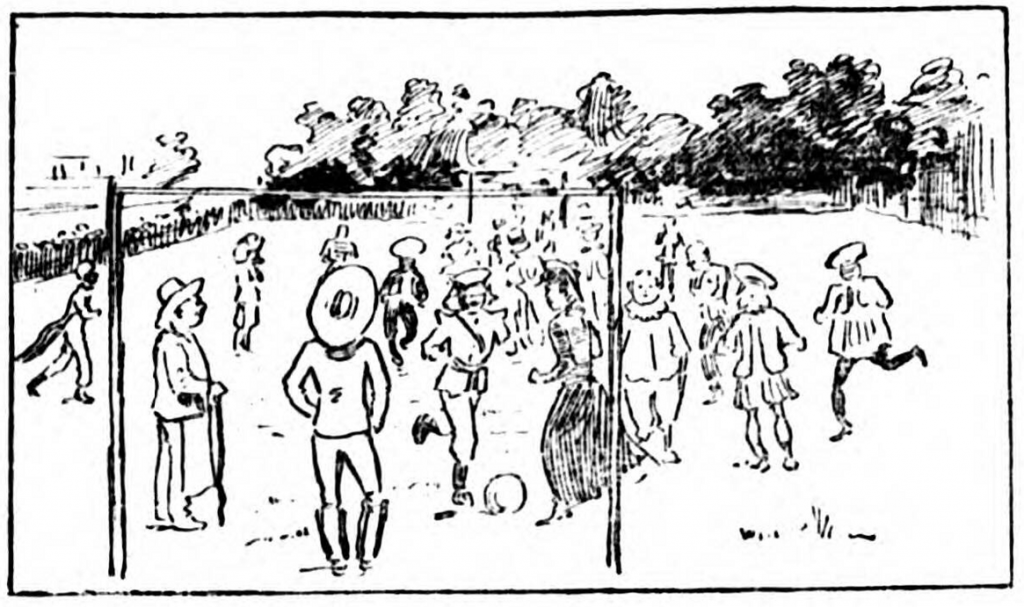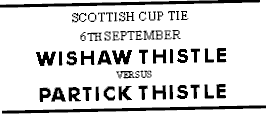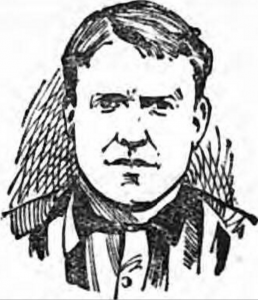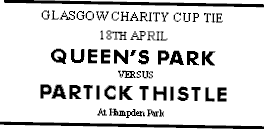1890-91 A Season of Change
-
Early Scottish Cup exit again
-
Scottish Alliance league is formed
The season began in an unusually light-hearted way, with a charity fancy-dress match at Inchview to benefit local junior team Minerva, between Minerva and the Irving Dramatic Club. Willie Paul, playing the fictional character Bob Acres, appeared, along with Celtic stars Willie Groves and Willie Maley.

Minerva FC benefit match at Inchview
However, come the start of the season proper, it appeared that Paul had left Inchview, to join Queen’s Park, a club that he had guested for a number of times the previous season. With this departure, Thistle had lost four of their players of the previous campaign – John Drummond had joined Preston North End (having played a game at the end of the previous season), Andrew Johnston had moved to Third Lanark, while David Hislop joined a number of ex-Thistle players at Rangers. Rangers also signed Thistle Swifts keeper Marshall, leading to the south-side club being accused of poaching Thistle players. One comment was “Rangers should say if they would like Partick Thistle to play their league matches for them”. A large number of new men signed for the season – five from local club Westburn.
 On the field things started well, with a 6-1 win over Newmilns, and a 9-6 away win over Port Glasgow Athletic. However, with so many departures, it was no surprise that Thistle struggled in their first test of the season – a Scottish Cup tie away to Wishaw Thistle. In years past this would not have been a significant hurdle, but with seven players making their debut for the club, Thistle lost two goals in the closing minutes to lose 3-2 and exit the Scottish Cup for the second year at the first stage.
On the field things started well, with a 6-1 win over Newmilns, and a 9-6 away win over Port Glasgow Athletic. However, with so many departures, it was no surprise that Thistle struggled in their first test of the season – a Scottish Cup tie away to Wishaw Thistle. In years past this would not have been a significant hurdle, but with seven players making their debut for the club, Thistle lost two goals in the closing minutes to lose 3-2 and exit the Scottish Cup for the second year at the first stage.
Fairfield were then beaten 4-2 at Inchview, as a further three players made their first competitive appearances for Thistle.
The Partick Thistle have a splendid set of forwards just now. They are all young players, and should yet be heard of.
Of the lot, Gilchrist and McLeod are perhaps the best. Both men are smart, and know how to play the passing game. Hope Robertson ii the centre binds the men well together, but depends more on his weight than on science.
The half backs are a strong trio, of whom Cameron in the centre is perhaps the best, although Smith and Proudfoot are not by any way duffers. McCulloch is the better back. His partner — Herd — is good in the open, has of little use when pressed. Practice should, however, remedy this defect.
McCorkindale is goal is as steady as ever., Those who have seen him play know what that means.
The Partick executive have to be congratulated in getting such a good team together.
[Scottish Referee 15 September 1890]
Dykebar, however, did prove an obstacle, and beat Thistle 5-4 at Thistle Park, prior to the first game of the season against Rangers. Despite the numbers of players having left Inchview, particularly on their way to Ibrox, Rangers still found it difficult to beat Thistle. It gave Partick Thistle a boost to see that their players were not missed, although they were happy to welcome back Willie Paul and Andrew Johnston to the team. Willie’s time at Hampden hadn’t been a great success and he had struggled to fit into the amateurs’ team. Thistle won the game 3-2, an astonishing score given the difference (on paper) between the two teams. “The Thistle supporters went nearly mad with delight when they scored the leading point. When the Jags put on another a few seconds later the Jags followers fairly yelled with hilarity,” reported the Scottish Referee.
Professionalism was a big issue in Scottish football in 1890. The SFA were determined not to follow the English FA in allowing players to be paid, although it was an open secret that some clubs already paid their players and were effectively professional clubs. Renton (a League club) and St Bernards had already fallen foul of the Professional Committee set up to ‘protect’ Scottish football.
On the eve of the third round Glasgow Cup tie against Cowlairs (another of the favoured League clubs), the game was abandoned, pending an SFA investigation into Cowlairs’ books. A preliminary inspection found that cash was unallocated, and a full investigation was to take place. Cowlairs secretary George Henderson was suspended from Scottish football for life, and his club for a month. Ex-Partick Thistle President Joseph Halley was now Secretary at Cowlairs, while the popular goalkeeper Andrew Duff was also at Cowlairs having left Thistle.
Whether the abandonment of the Cowlairs cup tie, which was awarded to Thistle, affected the players, the results certainly suffered – a 0-2 defeat at Linthouse, and a 1-4 loss at home to Abercorn preceded a poor 1-5 trouncing by Celtic in the Glasgow Cup semi-final. A protest was made about the weather conditions – Scottish Sport thought that “if McCorkindale could have kept his feet the score may have been different”, but the protest was rejected by the Glasgow FA. Roddy McLeod also was deserving of a special mention. “He is a young player of great promise, and if he sticks to the game he should yet come to the front,” said the Scottish Referee. Thistle fans hoped to see the best of him at Inchview.
John McCorkindale had been absent from the team against Abercorn, representing Glasgow, and being one of the few Glasgow players to get pass marks, in a 0-4 defeat away to Edinburgh. Andrew Duff, who deputised, had been Abercorn’s goalie for several seasons after a distinguished career as Thistle’s regular goalkeeper in the 1880s.
The exodus continued from Inchview, with J.Smith leaving the club to join Irish club Belfast, while Rangers again took advantage, signing Thomas McCulloch. Hope Robertson, who had played a handful of games the previous season before a short spell with Woolwich Arsenal, and a few this, left Inchview for Everton, for a signing-on fee of £50 and a wage of £3 10s per week. Willie Paul remained loyal to Thistle after playing a few games for Queen’s Park earlier in the season, this time turning down an extremely lucrative move to Wolverhampton Wanderers.
Glasgow Thistle were beaten 1-0 at Beechwood, before the return match was played against Rangers. Matches against Rangers were always keenly anticipated, and more often than not ended in good results for Thistle. “The Rangers will never crow big if the Partick Thistle can help it. To beat the Light Blues on Ibrox or Inchview is barrow to their bones,” explained the Scottish Referee. Despite the defections from Thistle to Rangers, the score ended 1-1 and the run of good results against Rangers continued.
A 4-0 win over Pollokshaws at Inchview preceded the annual New Year trip south, where Bootle (2-2 draw) and Sheffield Wednesday (2-3 defeat) were the opposition.

Roddy McLeod
Less than a month after Thomas McCulloch joined Rangers, it was reported that he had been approached by a Partick Thistle player, acting as an agent for an English club, but the individual wasn’t identified. The following week McCulloch joined Roddy McLeod of Thistle, and McCallum of Celtic, as they all signed for West Bromwich Albion. The players received £35 each for signing and £3 10s a week in wages. McCulloch and McLeod went on to win FA Cup winners medals with Albion the following season.
Sunderland Albion were shopping in Scotland too – Thistle’s Billy Fleming was expected to transfer to there along with Burke of Third Lanark and two players from Cowlairs. It was becoming increasingly difficult for Scottish non-league clubs to keep their players.
Having exited from the Scottish and Glasgow Cups, it became evident that the main benefit of the Scottish League, in its first season, was the continuing hold over spectators’ interest for the whole season. As Thistle continued to fill their weekends with friendlies, some so meaningless that the press began to forget to furnish reports, the League clubs prospered. Players were keen to move to League clubs, as the non-league clubs suffered through lack of competition with the top clubs. Something had to be done, and the idea of another league began to formulate.
In terrible conditions a match of two 20 minutes halves was played against Port Glasgow Athletic, and won 1-0. A clearly discomforted journalist had a heartfelt plea:
So important a club as the Thistle should ere this have provided accommodation for the press. To sit in the open on a cold dry day is bad enough, but when the temperature is at zero, and the wind is discovering the weak spots in your ulster, and the rain is dripping from your hat and trickling from the point of your nose on to your copy, matters become twenty times worse. At other clubs where there is no press box the pavilion is so situated that the game can be seen from the windows, but at Inchview this is not possible.
Thistle continued with wins over Kilbirnie and Mossend Swifts, and a draw with Methlan Park, before travelling to Belfast to take on, and lose to, Linfield Athletic in an unfriendly game. Two Thistle players were injured.
In a reserve game at Cathkin Thistle arrived without goalkeeper Sutherland ad had to play with ten men and an outfield player in goal. A creditable 3-3 draw was recorded.
“The natural outcome of the Scottish League is the Scottish Alliance, which was formed last Thursday evening (26th February). The League had pursued such a selfish policy, and had shown such utter disregard for the considerations of the clubs outside their own immediate circle, even for those who for many years stood on the most friendly relations to these clubs, that, for their own protection, these latter concluded that they were duty bound to protect themselves. The League clubs, when they had an open date, with remarkable condescension, gave the date to one of their old friends, but as a matter of fact, these engagements have not always been fulfilled, but have been thrown over in favour of a delayed League fixture. This sort of thing naturally created friction, and it soon became evident that it was unbecoming the dignity of any club to be treated this way. This Alliance has long been talked of, and is now an established fact; one too which the League clubs may find will have much influence in Scottish football, because it’s object is not to create friction by a selfish disregard for the feelings of others, but to endeavour to exist in harmony with the powers that be, and kindred clubs.
The clubs forming the Alliance are Partick Thistle, Glasgow Thistle, Northern, Clyde, Linthouse, East Stirlingshire, Port Glasgow Athletic, Greenock Morton, Kilmarnock, Airdrieonians, and Leith Athletic…..The Alliance has invited Queen’s Park to join…..It is improbable that the Queen’s Park will depart from the position it has taken with regard to the League…..Applications have been received from Kings Park, Glasgow Wanderers, Pollokshaws, Royal Albert etc, and one of these will be selected…..for the twelfth place…..The Alliance is also determined to give unqualified support to the Scottish Association…..and also with provincial Associations. In this it has acted with wisdom, and has removed what was and still is the great objection to the Scottish League, namely that it has never shown any consideration for the parent or other bodies…..The Scottish Alliance, to mark it’s opinion of the League…..has resolved to play no matches, except of course, compulsory cup ties, with league clubs.” Scottish Sport.
Although Queen’s Park were still opposed to the concept of league football, to the extent of refusing to play League clubs, they did not cancel a game at Inchview, where Thistle again tried to get the better of the famous club. Again Thistle lost, 2-1, although this was a good performance against a strong side. A less impressive result had been achieved the previous week, on the day after the annual dance had been held. Linthouse were visited, and they dealt a 2-8 thrashing to the hung-over Thistle players.
John Boag presided over a meeting of the Scottish Alliance, at which Ayr were invited to join the other eleven member clubs, at the expense of Kings Park, Falkirk and Edinburgh Northern. John Boag was appointed acting chairman of the Alliance until the next meeting.
John McCorkindale became Thistle’s second internationalist, when he replaced George Gillespie in the Scotland team who faced Wales. Although not a poor performance from McCorkindale, Scotland conceded three goals, winning the game 4-3. That same day Thistle travelled to Birmingham to play Aston Villa. Without McCorkindale – Carson of Glasgow Thistle deputised – the game was lost 10-0. The following day a 3-3 draw was recorded against Ardwick.
The Greenock Charity Cup had been a popular tournament for Thistle, but this year, faced with Dumbarton at Cappielow, saw an early exit after a 2-0 defeat.
Scottish Sport reported a growing suspicion that the advantages of the Scottish League were outweighed by the disadvantages. What these disadvantages were was not explained, but the suggestion that the League be disbanded and a Glasgow League formed suggests a problem with travel. Queen’s Park, Celtic, Rangers, Third Lanark, Cowlairs, Cambuslang, Partick Thistle and Clyde were the teams mentioned. Despite these misgivings about league football, several of the clubs who had been rejected by the Alliance met in Glasgow to discuss the forming of a Scottish Federation.
 Thistle were given another opportunity to match themselves against the best in the country when paired with Queen’s Park, again, in the first round of the Glasgow Charity Cup. This was a tournament that Thistle had been keen to get involved in for a number of years. The Scottish League clubs declined to take part this year, and this gave the opportunity to others to take their place. Thistle were in the process of rebuilding their team, and gave competitive debuts to three players. George Gorham had left the club, moving to Clyde, with two players moving from there to Inchview. Although another 1-2 defeat was recorded, it was another good result for an improving team. £73 was the gate money raised for charity – the biggest gate of the tournament.
Thistle were given another opportunity to match themselves against the best in the country when paired with Queen’s Park, again, in the first round of the Glasgow Charity Cup. This was a tournament that Thistle had been keen to get involved in for a number of years. The Scottish League clubs declined to take part this year, and this gave the opportunity to others to take their place. Thistle were in the process of rebuilding their team, and gave competitive debuts to three players. George Gorham had left the club, moving to Clyde, with two players moving from there to Inchview. Although another 1-2 defeat was recorded, it was another good result for an improving team. £73 was the gate money raised for charity – the biggest gate of the tournament.
The season began to peter out, with only a few friendlies to keep the interest of the Thistle supporters. An ill-tempered game at Govan against Linthouse saw Linthouse captain James Rodgers break his leg. Ironically, or not, when the two teams had met the previous season, a Thistle player had had his leg broken. No final score was given for the game.
The final game of the season saw a poor performance from Thistle in front of an expectant crowd at Airdrieonians. Thistle lost 7-1.
The SFA rules disallowed players who had moved to England to turn professional to return to play again in Scotland, even at amateur level. However, they announced an amnesty to all players who had left for England. This allowed Thistle to include J.Stewart in the team against Airdrie. Stewart had left in 1888 to play with Hartlepool.
However, the action was off the park as teams discovered their destinies, for the following season at least. Leith Athletic and Clyde, founder members of the Alliance, dropped their aversion to the Scottish League clubs by accepting an invitation to join the big clubs. St Bernards, dropped by the League, were invited to join the Alliance. John Boag was elected President of the Scottish Alliance. Not surprisingly, a proposal from the press that the two bodies should merge were rejected unanimously.
As the big clubs took more and more control over the affairs of football via the League, and Alliance, so there were calls for a Qualifying Cup to be established for the Scottish Cup, to cut down on the number of games being played in the competition.
The season ended with two matches at Inchview in aid of charity. The first was billed as a “Grand Character Match”, involving the Irving Dramatic Club who had opended the season. The players who took part are unknown, althouth the characters who made up the teams make interesting, if bizarre, reading. Partick Thistle lined up: Artful Dodger; Dudeworthy, Sweeney Todd; Chinaman, Tommy Atkins, Mary Anderson; Silver King, McGinty, Prince Charlie, Tom Bowling, A Warrior Bold. The Irving team was: Pirate; Policeman, Slavey; Nero, Malabar, Mikado; Alley Sloper, Tootsie, Bluebeard, Annie Rooney, Rob Roy. The referee was Old Nick, who rode about the field on horseback.
The second charity match was more interesting, combining a team of past Thistle players with the current side. The match was in aid of the Whiteinch Orphanage funds. The Past team was: Andrew Duff; John Hendry, Thomas Campbell; Robert Robertson, Geo Ward, Robert Marshall; Jerry Suter, Andrew Johnstone, A.Mackay, John Young, David Hislop. The current team lined up: John McCorkindale; John Herd, William Proudfoot; J.Smith, John Cameron, John Stewart; Willie Paul, J.H.Davie, Walter Keay, Sam Clark, John Gilchrist.
The Annual General Meeting was held at the Victoria Hall, with Walter McLean jnr presiding. The following were elected in preperation for the first season of sustained competition in the Alliance.
- President – David Hastie
- Vice President – Walter McLean jnr
- Hon. Secretary – J.Goudie
- Match Secretary – Andrew M Smith, 73 Byars (sic) Road
- 1st XI Captain – John McCorkindale
- Swifts Captain – David Freebairn
- Committee – J.N.Boag, A.Auchterlonie, J.Dougall, J.Hendrie, A.Fraser, A.Ross jnr
- Alliance rep – J.N.Boag
- Glasgow FA rep – D.Hastie
- 2nd XI FA rep – A.M.Smith
Categories
- Miscellaneous (16)
- Other clubs (15)
- Players (26)
- Thistle – early years (48)
- Thistle – general (5)
Football history links
- Ayr United archive
- Bill Shankly
- Falkirk Historian
- Gallant Pioneers – Early history of Rangers
- Glasgow Herald archive at Google
- Hibernian
- Hibernian Historical Trust
- London Hearts
- Partick Thistle history archive by StuTheJag
- Rangers History
- Scottish Football Historical Archive
- Scottish Football Museum
- Scottish Sports History
- ScottishLeague.net and forum
